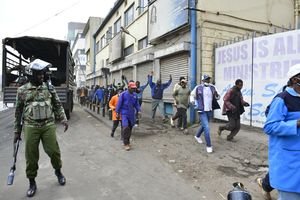
Security agencies have unveiled new strategies to address the rising insecurity involving juvenile gangs and criminal elements hiding within the tuk-tuk and boda-boda transport industries to rob commuters.
Mr Tony Tenguri had just finished his day's work in Mombasa Central Business District and was on his way home to the Bamburi area in Kisauni on Friday evening when his new OPPO phone was stolen in less than 10 minutes.
The unfortunate incident unfolded in a manner that seemed almost scripted, with a pair of suspected criminals posing as a tuk-tuk operator and his customer, executing their deceitful plan with precision and efficiency.
At around 5.45 pm, Mr Tenguri walked to Mwembe Tayari, opposite Naivas Supermarket in Mombasa, to board a tuk-tuk for his journey home.
As he approached the tuk-tuk, he noticed that there were two men inside - the driver and another person who appeared to be a male passenger.
The latter pretended to be talking on the phone, a seemingly innocent act that was later revealed to be part of their ruse.
As Mr Tenguri settled into the tuk-tuk, he noticed that the door had been left open while the tuk-tuk was in motion.
Concerned, he asked why it had not been closed. The driver casually asked him to close it.
"I tried, but the door would not close," he said.
The driver then told him to pull harder, but the door still would not close.
At this point, the so-called passenger intervened, pretending to be helpful.
"You'll break the door if you keep trying," the passenger said, leaning over him as if to help him.
As he pressed hard against Mr Tenguri, supposedly to close the door, he deftly reached into his pocket and pulled out the mobile phone.
However, due to the friction between their bodies and the movement of the tuk-tuk, the victim was unaware of the theft that had just occurred.
Eventually, the door closed, but the ride was cut short moments later.
"The driver stopped abruptly, claiming they had changed their minds about going to Bamburi. They offered no further explanation.
So they told me to get out and get another tuk-tuk," he said.
Stunned but compliant, he stepped out of the tuk-tuk.
It was only after the tuk-tuk had sped away that he checked his pocket and discovered that his smartphone was missing.
Without the presence of mind to write down the tuk-tuk's registration number, Mr Tenguri was left helpless as the three-wheeler disappeared into the evening traffic.
He reported the theft to the Central Police Station under OB 14/22/12/2024. According to the police statement, the phone is valued at Sh24,000.
"They asked me to give the serial number of the phone to the Criminal Investigation Department (CID), which I did. The CID informed me that they would trace it after two weeks," he said.
His ordeal is just one of many similar cases reported in Mombasa recently, as a new wave of crime raises concerns among residents and holidaymakers.
At the police station, Mr Tenguri said he had met several other victims with similar stories of tuk-tuk and motorcycle theft.
Such incidents have been on the rise in the port city, especially during the festive season when many holidaymakers flock to Mombasa for Christmas and New Year celebrations.
In another incident caught on CCTV, three suspects on a motorbike robbed a woman of her purse in Mombasa town.
The footage, which was circulated on social media, shows the trio slowing down as they approached the woman before one of them snatched her purse and sped off.
However, their escape was temporarily thwarted when an oncoming car, whose driver had noticed the crime, rammed into their motorcycle, knocking them off.
Angry residents, attracted by the woman's scream, chased the suspects before they disappeared from view.
Although the suspects managed to flee the scene, this incident highlights the brazen nature of these criminals.
In another incident also caught on CCTV, a man was stabbed with an unidentified object in the Marikiti area of Mombasa town.
The elderly man, of Asian origin, was walking down a street in the market when a young man, pretending to be hawking carrier bags, stabbed him before grabbing something from the victim's hand and running away.
The video showed the victim looking confused as to what had happened, while a group of people gathered around to check on his injury.
While all this is happening in the county, the security services have claimed that they have stepped up measures to tackle the problem.
However, they have admitted that while tuk-tuks and motorbikes are convenient means of transport, they have been infiltrated by criminals to prey on unsuspecting commuters.
In response, the security agencies have unveiled new strategies to address the growing insecurity involving youth gangs and criminal elements hiding within the tuk-tuk and boda-boda transport industry to rob commuters.
The measures also aim to ensure the safety of holidaymakers who flock to the port city during the December festivities.
One of the key initiatives is to engage directly with youth gangs and their families through door-to-door peace talks to sensitise suspects and discourage criminal behaviour.
According to Likoni Sub-County Police Commander Geoffrey Ruheni, the approach is not punitive but aims to open a dialogue between security officers, suspected criminals and their parents.
"We will not arrest or beat them but talk to them and their parents. The aim is to let them know that we are aware of their activities and will take action if necessary," Ruheni said during a community policing forum in Shika Adabu.
The initiative will start in Mlima, a hotspot for criminal activity, before spreading to other areas. Security officials believe that marking these individuals as suspects and issuing them with warnings will encourage them to stop their illegal activities or leave the area altogether.
Community policing members and Nyumba Kumi ambassadors have been tasked with assisting in these efforts.
Mr Ruheni has called on the community to join these efforts to help reduce or eradicate crime in these areas. He lamented that locals are often reluctant to report criminals for fear of reprisals, which in turn weakens the judicial process as victims and witnesses are reluctant to make statements or testify in court.
"When arrests are made, the same community blames the police for releasing suspects, but no one is willing to support the prosecution," he added.
In another effort to improve security, tuk-tuk and boda boda operators are now required to register with Savings and Credit Cooperative Organisations (Saccos).
According to Mombasa County Commissioner Mohamed Noor, the move is aimed at bringing order to the transport sector, which has been exploited by criminals.
"We need to streamline the operations of the three-wheeler taxi and boda-boda businesses to make it easier to identify and deal with elements who use the trade as a cover for criminal enterprises," said Noor.
He said the measure would not only help the authorities identify rogue operators, but also instil discipline within the sector.
Mr Noor lamented that unregistered operators make it easy for criminals to use the vehicle to facilitate the commission of crimes such as phone snatching and theft, undermining the security and reputation of the transport industry.
While acknowledging the importance of the tuk-tuk industry in employing thousands and providing affordable transport, Mr Noor warned that some criminal elements have infiltrated the industry to pursue their agenda.
"We want every tuk-tuk owner to register with a Sacco. This will help us identify criminals and deal with them. We want the industry to be customer-friendly, where people feel safe using these three-wheelers," he added.
However, the county commissioner pointed out that despite its benefits, the industry has been infiltrated by people with "bad motives" who engage in crimes such as phone snatching and other forms of theft.
"Like matatus, they will be suspended by the National Transport and Safety Authority if they are involved in an accident. These saccos will help us maintain discipline in the sector so that it can continue to support the country's economy. We want to root out all criminals from the industry," he said.
The Commissioner said the new measures are designed to ensure that this vital industry does not become a haven for criminals.
Community policing members from the six sub-counties of Mvita, Kisauni, Nyali, Jomvu, Changamwe and Likoni have been undergoing training for the past week to assist security agencies in tackling the youth gang and crime menace in the county.
The Kenya Peace and Security Support Initiative (KEPSSI), in partnership with the Kenya Ports Authority, has been instrumental in training community policing and peace committees in these six sub-counties.
KEPSSI chairman Ibrahim Ng'ang'a said the rising crime rate in the county necessitated security initiatives aimed at equipping local peace committees with updated tools and strategies to tackle emerging security challenges.
"We are training these committees on new trends in peacekeeping, government policies and stakeholder engagement strategies. There is also a new multi-sectoral peace and security committee that will work with these sub-county teams to address emerging security challenges," he added.
Ng'ang'a acknowledged that youth gangs remain a major problem in areas such as Likoni and Kisauni.
These gangs, some made up of children as young as ten, have been terrorising residents with machetes and other weapons.
To address this, KEPSSI's peace initiatives include working with schools, parents' associations and local leaders to identify and address the root causes of youth involvement in crime.
Community leaders have stressed the importance of parental responsibility in tackling juvenile delinquency.
Irene Randu, chairperson of the Kisauni Peace Committee, attributed rising crime rates to broken families, poverty and lack of parental guidance.
"Divorce leaves children traumatised and without proper guidance. Many are left in the care of elderly guardians while parents either seek employment abroad or fail to monitor their children's behaviour," said Randu.
Randu also stressed the need for holistic interventions to address poverty, hunger and drug abuse in addition to security measures.
The training aimed to adapt peace committees to the evolving security challenges. These committees are expected to bridge the gap between residents and law enforcement, fostering trust and collaboration.










